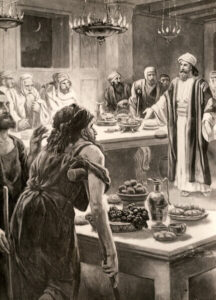Jesus’ Parable of the Wedding Banquet
Jesus’ parable of the wedding banquet illustrates some very important principles of God’s kingdom. He told it to Jewish people of the first century, but he also intended it to be for us today, as it speaks of the breadth and depth of God’s grace and the extent of Christ’s atoning sacrifice.
Both Matthew and Luke record a parable of a banquet. There are some differences between the two versions, but the storyline is basically the same. In Matthew’s version the host is a king giving a wedding banquet for his son, while in Luke’s the host is just a man giving a large banquet. They may have originally been the same parable but retold by two different authors. Or they may have been two parables told by Jesus at different times. But in this article, we will interpret them as one parable.
The ancient Jewish people believed that the beginning of the promised Messianic kingdom would be celebrated by a large feast (Isaiah 25:6-8). Jesus affirmed this to be true and spoke about it in his teachings (Matthew 8:11, Luke 13:29). In Luke’s account, Jesus told this parable in response to a man who exclaimed, “Blessed is the one who will eat at the feast in the kingdom of God” (Luke 14:15).
The wedding banquet
The parable of the wedding banquet begins as follows:
The kingdom of heaven is like a king who prepared a wedding banquet for his son. He sent his servants to those who had been invited to the banquet to tell them to come, but they refused to come. Then he sent some more servants and said, “Tell those who have been invited that I have prepared my dinner: My oxen and fattened cattle have been butchered, and everything is ready. Come to the wedding banquet.” (Matthew 22:1-4)
The fact that the host is a king gives the story drama. The king wanted the wedding banquet for his son to be well-attended and he wanted the dinner tables full. The occasion was very important to him, and he wanted the event to be a success. The carefully prepared meal was to be appreciated, not scorned and wasted by people who didn’t value it.
That the parable is about a king and his son tells us right away these are references to God and his Son Jesus. This makes the interpretation fairly straightforward.
Israel’s rejection of God’s invitation
When the king’s servants delivered the message for the invitees to come, they refused and ignored the invitation. Some even mistreated the messengers:
But they paid no attention and went off—one to his field, another to his business. The rest seized his servants, mistreated them and killed them. The king was enraged. He sent his army and destroyed those murderers and burned their city. (Matthew 22:5-6)
Understandably, this enraged the king. A king deserves respect from his subjects and those that mistreated his messengers deserved punishment.
Of course, this story contains hyperbole—it’s a worst-case scenario for any king. But this actually occurred in Jewish history when God sent his prophets to Israel many times, only to be rejected, mistreated and even killed. God finally took action and destroyed Jerusalem in 587 B.C. by allowing the Babylonians to besiege the city and conquer it. This also turned out to be prophetic, as it happened again in 70 A.D. when the Romans destroyed the rebuilt temple and city.
Excuses for not coming
In Luke’s version of the parable, all those who were first invited made excuses:
But they all alike began to make excuses. The first said, “I have just bought a field, and I must go and see it. Please excuse me.” Another said, “I have just bought five yoke of oxen, and I’m on my way to try them out. Please excuse me.” Still another said, “I just got married, so I can’t come.” (Luke 14:18-20)
Jesus wanted us to see these rejections as excuses and not legitimate reasons. These were people with wealth and prestige who felt they were above attending the event. It wasn’t worth their time, and they just couldn’t be bothered. More importantly, those who declined the host’s gracious offer didn’t respect the host. They spurned the invitation because they didn’t honor the one who sent it.
All are invited to the wedding feast
So, the king ordered his servants to go out into the streets to bring in as many people as they could find:
Then he said to his servants, “The wedding banquet is ready, but those I invited did not deserve to come. So go to the street corners and invite to the banquet anyone you find.” So the servants went out into the streets and gathered all the people they could find, the bad as well as the good, and the wedding hall was filled with guests. (Matthew 22:8-10)
This clearly speaks of the Jewish leaders‘ rejection of God’s grace by refusing to accept Christ as their Messiah. They didn’t deserve to come to God’s banquet celebrating his Messianic kingdom because they rejected his Son.
God then sent the gospel to the common folk, the poor, and the sinful. Lastly, he sent the gospel to the Gentiles. The Gentiles previously had no standing with God and didn’t deserve to come to the feast either, but because of God’s mercy, he now welcomed them in (Romans 15:8-9).
In Luke’s version, the host of the banquet ordered his servant to bring in anyone he could find, even the most unlikely guests. The host then swears that none of those originally invited (those who rejected Jesus as Messiah) would even taste the food at the banquet:
“Go out quickly into the streets and alleys of the town and bring in the poor, the crippled, the blind and the lame.” “Sir,” the servant said, “what you ordered has been done, but there is still room.” Then the master told his servant, “Go out to the roads and country lanes and compel them to come in, so that my house will be full. I tell you, not one of those who were invited will get a taste of my banquet.” (Luke 14:21-24)

Proper clothes for the wedding banquet
The king wanted the wedding banquet to be special, with plenty of pageantry. So, he provided the guests with wedding clothes after they arrived and expected them to wear them. Especially those brought in from the streets would need a change of clothes. If they didn’t want to wear the wedding clothes, they weren’t allowed into the feast as that would insult the king.
But when the king came in to see the guests, he noticed a man there who was not wearing wedding clothes. He asked, “How did you get in here without wedding clothes, friend?” The man was speechless. Then the king told the attendants, “Tie him hand and foot, and throw him outside, into the darkness, where there will be weeping and gnashing of teeth.” For many are invited, but few are chosen. (Matthew 22:11-14)
In this parable someone found their way into the event through the back door or through some other means and showed up without wedding clothes. He was “crashing the party.” The issue was not that he didn’t have an invitation, since everyone was invited. The issue was he didn’t enter the party through the approved entrance and with the provided attire.
Clothed with Christ
What you wear to a formal dinner is usually important. You will offend the host if you come in very informal attire. And you will most definitely offend if your clothes are dirty or torn. So, what do the wedding clothes represent in this parable? The garment of the righteousness of Christ:
…. for all of you who were baptized into Christ have clothed yourselves with Christ. (Galatians 3:27)
God graciously provides Christ as a righteous covering, that we may be acceptable to him and able to enter his presence holy and pure. Those who believe in him have put him on as a garment. And this new clothing is not just a veneer. It transforms the inner person and expresses itself in real and tangible ways: in a righteous life that pleases God and in acts of service to the Lord.
And the approved entrance to the banquet is none other than Christ himself, who is the door of the sheep:
Therefore Jesus said again, “Very truly I tell you, I am the gate for the sheep.” (John 10:7)
Many are invited but few are chosen
Jesus’ concluding statement for the parable of the wedding banquet is “For many are invited but few are chosen” (Matthew 22:14). Unfortunately, many sincere believers think this means that God chooses those who will be saved apart from their faith in him. But this ignores the storyline of the parable.
Who are the “chosen” Jesus referred to in the parable? They are the ones the king chose to be a part of his celebration. And who are the ones he chose? They are those who accepted his invitation. The king invited all, but only some chose to attend. In other words, those who valued their relationship with him are the ones he chose to be a part of the event. In the same way, those whom God chooses to be a part of his kingdom are those who accept his offer of salvation, who enter the door through faith in Christ, and put on Christ as their righteous covering.
God’s invitation into his kingdom is universal—it’s to everyone. Among the Gentiles, he invites even the most unworthy: sinners, criminals, the irreligious, and the ungodly. But the attendance will be selective, based on a positive faith response to God’s gracious offer.
Accepting the invitation
Have you ever been treated to fancy dinner like a wedding party? What is required of you to enjoy it? You first have to accept the invitation. Then you show up, sit where you are told to sit, and start eating. That’s it. At the end—and maybe even more than once—you will express your appreciation to the host.
The host invited you because they wanted you to come and celebrate. If you value your relationship with the host, you will come and participate. But if you reject the offer, you need to have a legitimate excuse. Otherwise, it’s an offense and your relationship with the host is damaged. If you didn’t value your relationship with this person, then this act will confirm it to them.
The cost is covered
After the meal, no one worries, because the host has already paid for the food. Those who didn’t come could have enjoyed the meal, and their food would’ve been paid for also, because there was plenty to go around for everyone. This is the meaning of Christ’s atoning sacrifice: the penalty for sins has been paid, the cost has been covered for everyone (1 John 2:2). This is God’s provision for our sin, but we must accept it to enjoy its benefits.
What would happen if you told the host you would only accept the invitation if you could pay for the meal yourself? He would say: “You can’t pay for it because I already paid for it, and it’s my gift to you. This dinner party is a celebration. Please come and enjoy.” But if we argue and insist on paying our way, then the host would probably say, “then don’t come because I won’t accept any payment.” Any self-payment would be meaningless and have no value.
It’s the same with salvation: God graciously provides it as a free gift. And it can’t be earned or bought. If we insist on paying for it, then we can’t partake of it.
Honoring God
To accept a dinner invitation, we must have some level of trust (faith) in the host, believing his motives are good. But people who don’t respect or trust the host and won’t believe the gift has any value and will not accept it.
When we arrive, we may or may not be aware that the host had invited many others that didn’t come. These people could have come, but they chose not to. Maybe they thought it wasn’t a sincere offer. Or maybe they didn’t like the other people that would be there. But the underlying reason for these excuses was that they didn’t value their relationship with the host. As a result, they had no sincere appreciation for the offer and had no intention of attending.
In the same way, those who reject God’s offer of salvation don’t honor God in their lives and don’t want a relationship with him. They are in fact rejecting him. But he is the Lord of all and deserves respect and honor. He owns and rules the universe and is not to be snubbed.
God’s invitation to his wedding feast
Do you understand that God has invited you to a very special event? It’s a great feast in honor of God’s Son, celebrating his marriage to the people of God and his eternal reign as Messiah. If you accept, God will give you clean, new garments reflecting Christ himself.
God expects you to accept the invitation. But if you ignore it, he will be very disappointed. In fact, it will make him angry and there will be a final judgment awaiting you. He is offering you his abundant and eternal riches for your enjoyment. Don’t pass this up, as it will be the greatest privilege of your life.
“Hallelujah! For our Lord God Almighty reigns. Let us rejoice and be glad and give him glory! For the wedding of the Lamb has come, and his bride has made herself ready. Fine linen, bright and clean, was given her to wear.” (Revelation 19:6-8)
Christ in Scripture is listed on Feedspot Top 200 Christian Blogs.







1 thought on “Jesus’ Parable of the Wedding Banquet”
Great post. This is such a great parable. Hopefully many will heed the words and accept the invitation.